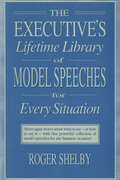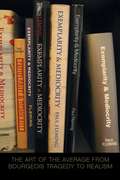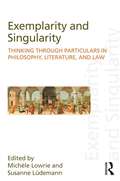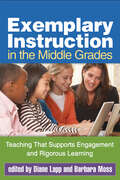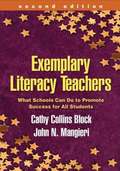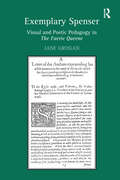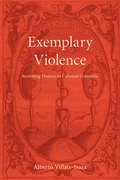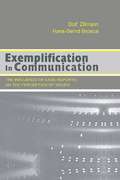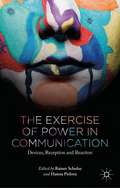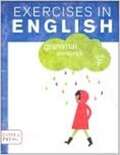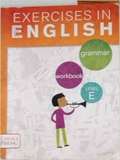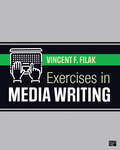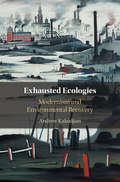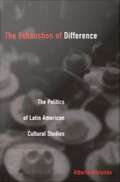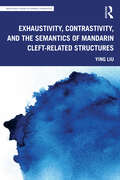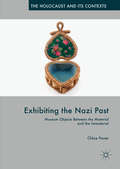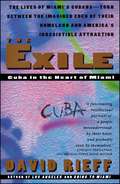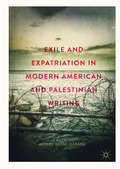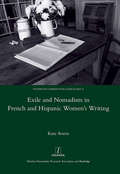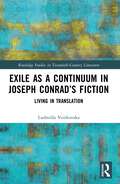- Table View
- List View
Executives Lifetime Library of Model Speeches for Every Situation
by Roger ShelbyThis resource provides over 200 ready-to-use model speeches covering many different business purposes and situations. The library should be broad enough to be used by executives in all types of industry and all size firms.
Exemplarity and Mediocrity
by Paul FlemingFollowing Hegel's analysis of art's increasing difficulty to both engage and extricate itself from prosaic reality, Paul Fleming investigates the strategies employed by German literature from 1750 to 1850 for increasingly attuning itself to quotidian life-common heroes, everyday life, non-extraordinary events-while also avoiding all notions of mediocrity. He focuses on three sites of this tension: the average audience (Lessing), the average artist (Goethe and Schiller), and the everyday, or average life (Grillparzer and Stifter). The book's title,Exemplarity and Mediocrity, describes both a disjunctive and a conjunctive relation. Read disjunctively, modern art must display the "exemplary originality" (Kant) that only genius can provide and is thus fundamentally opposed to mediocrity as that which does not stand out or lacks distinctiveness; in the conjunctive sense, modern art turns to non-exceptional life in order to transform it-without forsaking its commonness-thereby producing exemplary forms of mediocrity that both represent the non-exceptional and, insofar as they stand outside the group they represent, are something other than mediocre.
Exemplarity and Singularity: Thinking through Particulars in Philosophy, Literature, and Law
by Susanne Lüdemann Michele LowrieThis book pursues a strand in the history of thought – ranging from codified statutes to looser social expectations – that uses particulars, more specifically examples, to produce norms. Much intellectual history takes ancient Greece as a point of departure. But the practice of exemplarity is historically rooted firmly in ancient Roman rhetoric, oratory, literature, and law – genres that also secured its transmission. Their pragmatic approach results in a conceptualization of politics, social organization, philosophy, and law that is derived from the concrete. It is commonly supposed that, with the shift from pre-modern to modern ways of thinking – as modern knowledge came to privilege abstraction over exempla, the general over the particular – exemplarity lost its way. This book reveals the limits of this understanding. Tracing the role of exemplarity from Rome through to its influence on the fields of literature, politics, philosophy, psychoanalysis and law, it shows how Roman exemplarity has subsisted, not only as a figure of thought, but also as an alternative way to organize and to transmit knowledge.
Exemplary Instruction in the Middle Grades: Teaching That Supports Engagement and Rigorous Learning
by Diane Lapp Barbara MossOffering fresh alternatives to common instructional practices that fail to get results, this accessible, highly practical guide highlights ways to motivate middle school students while enhancing content-area learning. Each chapter features an enlightening case study of a teacher whose current strategies are not supported by research; describes effective instructional alternatives, illustrated with concrete examples; and lists online resources and lesson examples. Emphasis is given to supporting critical engagement with texts and drawing on technology and new literacies. The book covers specific content areas—including science, social studies, math, and literature—as well as ways to teach oral literacy and writing across the curriculum.
Exemplary Literacy Teachers, Second Edition
by Cathy Collins Block John MangieriIdentifying what exemplary teachers know and do to promote literacy achievement at every grade level, this highly motivating book provides step-by-step guidance for professional development. It helps teachers assess their strengths and build their competencies in six key domains of literacy instruction directly linked to student success. Featuring skills-building exercises, sample lesson plans, book lists, and over a dozen reproducibles, the book illustrates specific actions that teachers can take to emulate their most effective colleagues in school districts around the country. New to This Edition Revised and updated based on the authors' professional development work with over 20,000 educators. Expanded to cover K 12 (prior edition covered K 5). Now includes material for literacy coaches and administrators, as well as teachers. "Teacher-in-Action" cases offer vivid snapshots of exemplary practices. Many of the activities and reproducibles are new or revised.
Exemplary Spenser: Visual and Poetic Pedagogy in The Faerie Queene
by Jane GroganExemplary Spenser analyses the didactic poetics of The Faerie Queene, renewing attention to its avowed attempt to "fashion a gentleman or noble person in vertuous and gentle discipline" and examining how Spenser mobilises his pedagogic concerns through the reading experience of the poem. Grogan's investigation shows how Spenser transacts the public life of the nation heuristically, prompting a reflective reading experience that compels engagement with other readers, other texts and other political communities. Negotiating between competing pedagogical traditions, she shows how Spenser's epic challenges the more conservative prevailing impulses of humanist pedagogy to espouse a radical didacticism capable of inventing a more active and responsible reader. To this end, Grogan examines a wide variety of Spenser's techniques and sources, including Philip Sidney's Defence of Poesy and the powerful visually-couched epistemological paradigms of early modern culture, ekphrasis among them. Importantly, Grogan examines how Spenser's didactic poetics was crucially shaped by readings of the Greek historian Xenophon's Cyropaedia, a text and influence previously overlooked by critics. Grogan concludes by reading the last book of The Faerie Queene, the Legend of Courtesy, as an attempt to reconcile his own didactic sources and poetics with the more recent tastes of his contemporaries for a courtesy theory less concerned with "vertuous and gentle discipline". Returning to the early modern reading experience, Grogan shows the sophisticated intertextual dexterity that goes into reading Spenser, where Spenserian pedagogy lies not simply in the textual body of the poem, but also in the act of reading it.
Exemplary Violence: Rewriting History in Colonial Colombia (Bucknell Studies in Latin American Literature and Theory)
by Alberto Villate-IsazaIn his seminal essay Discourse on Colonialism, Aimé Césaire asserts that colonization ultimately works to decivilize the colonizer, awakening baser, brutalizing, and dehumanizing instincts. In this crucial new study, Villate-Isaza explores the violent colonial history of the New Kingdom of Granada (modern-day Colombia and Venezuela) by examining three seventeenth-century historical accounts—Pedro Simón’s Noticias historiales, Juan Rodríguez Freile’s El carnero, and Lucas Fernández de Piedrahita’s Historia general—each of which reveals the colonizer’s reliance on the threat of violence to sustain order. Despite their attempts to convey a narrative of European political, technical, and moral superiority, these accounts reveal tensions between the writers’ social interests and personal identifications. As they attempt to reinforce the principal tenets of European civilization and Catholic Reformation orthodoxy, they also reveal contradictions that emerge when colonizers behave in barbaric ways.
Exemplification in Communication: the influence of Case Reports on the Perception of Issues (Routledge Communication Series)
by Hans-Bernd Brosius Dolf ZillmannThis volume offers a new conceptual framework for exemplification, a coherent theoretical approach based on contemporary psychological models of information processing, and an exhaustive integration of the pertinent research demonstrations. Focus is on the news media, but the influence of fiction and quasi-fiction is also considered. The informational competition between concrete, verbal, or pictorial exemplification and abstract, mostly quantitative exposition is analyzed. Implications for issue perception, including delayed consequences are also examined. Exemplification is subjected to conceptual scrutiny and a new theoretical framework is offered. Contemporary psychological paradigms are applied to predict effects of various forms of exemplification. Perhaps most important, novel experimental research is presented to document the specific consequences of exemplifications featured in the news, even of those featured in fiction. Finally, recommendations for information providers and recipients are derived from the research demonstration in order to advance media literacy specific to exemplification. This unique volume: * provides a comprehensive account of the power of case-report selection in the manipulation of perceptions of social issues, * addresses exemplification in communication, i.e., the influence of case reports in the news media, primarily, on the perception of pertinent social issues, * offers an empirical assessment of the practice of issue exemplifying by the media, * gives an exhaustive account of representative research on exemplification effects on issue perception--primarily by the news media, but also by the entertainment media, and * includes a compilation of guidelines for information providers and recipients in efforts at creating media literacy with regard to exemplification.
The Exercise of Power in Communication
by Rainer Schulze Hanna PishwaPower Exercise explores the various choices speakers or communicators make when expressing power relations in modern societies. The volume brings together several disciplines, such as linguistics, sociology, communication studies and social psychology, to give insight into how interactants co-construct different aspects of power in their everyday life. The chapters reveal that the power potential of linguistic elements is dependent on context and is by no means fixed or predetermined, whichprovides implications for research methodology.
Exercise Your College Reading Skills: Developing More Powerful Comprehension
by Janet ElderContains exercises designed to help students strengthen their college-level vocabulary and reading comprehension skills.
Exercises in English: Grammar for Life (Level D)
by Loyola PressExercises in English supplementary workbooks present grammar lessons in thoughtfully organized sentences that tell of fascinating historical figures, scientific discoveries, and inspiring lives.
Exercises in English 2013 Level F Student Book: Grammar Workbook (Exercises in English)
by Loyola PressExercises in English grammar workbooks are designed to give students in grades 3 through 8 comprehensive grammar practice in every area of grammar, usage, and mechanics. <p><p> Becoming stronger in grammar requires practice, and Exercises in English provides students with lifelong skills they will need to succeed.
Exercises In English 2013 Level G Student Book: Grammar Workbook (Exercises In English 2013 Series)
by Loyola PressExercises in English grammar workbooks are designed to give students in grades 3 through 8 comprehensive grammar practice in every area of grammar, usage, and mechanics. Features: More grammar practice than any other grammar workbook, allows students to master GUM skills, Spiral curriculum reinforces grammar skills in every grade, Self-teaching student grammar lessons optimize class time, Section reviews offer regular assessment opportunities, Becoming stronger in grammar requires practice, and this book provides students with lifelong skills they will need to succeed.
Exercises In English Grammar: Level E
by Loyola PressThe book provides grammar exercises and review.
Exercises In English: Grammar Workbook (Exercises In English)
by Loyola PressExercises in English Student Workbook, Level E (2013)
Exercises in Media Writing
by Vincent F. FilakExercises in Media Writing offers students multiple opportunities to practice their writing skills in-class or as take-home assignments. Each chapter includes review questions and writing-prompt activities to help students master the concepts and skills presented in Vincent F. Filak’s second edition of Dynamics of Media Writing. Additional exercises built around the unique demands of online newswriting will prepare students to meet the demands of a changing media landscape. Key Features: Review Questions help students recall and master core chapter concepts Writing Exercises enable students to recall and demonstrate their understanding of various elements found in each chapter in Dynamics of Media Writing, Second Edition. Bundle this workbook with Dynamics of Media Writing and save! Your students save when you bundle this text with a corresponding student workbook. Order using bundle ISBN 9781544361970.
Exercises in Media Writing
by Vincent F. FilakExercises in Media Writing offers students multiple opportunities to practice their writing skills in-class or as take-home assignments. Each chapter includes review questions and writing-prompt activities to help students master the concepts and skills presented in Vincent F. Filak’s second edition of Dynamics of Media Writing. Additional exercises built around the unique demands of online newswriting will prepare students to meet the demands of a changing media landscape. Key Features: Review Questions help students recall and master core chapter concepts Writing Exercises enable students to recall and demonstrate their understanding of various elements found in each chapter in Dynamics of Media Writing, Second Edition. Bundle this workbook with Dynamics of Media Writing and save! Your students save when you bundle this text with a corresponding student workbook. Order using bundle ISBN 9781544361970.
Exhausted Ecologies: Modernism and Environmental Recovery
by Andrew KalaidjianThis book evaluates twentieth century British and Global Anglophone literature in relation to the growth of ecological thinking in the United Kingdom. Restless modernists such as D. H. Lawrence, James Joyce, Djuna Barnes, and Jean Rhys developed a literary aesthetic of slowness and immediacy to critique the exhausting and dehumanizing aspects of modern urban and industrial life. At the same time, environmental groups such as the Society for the Promotion of Nature Reserves and the Smoke Abatement League moved from economic registers of 'value' and 'trust' to more cultural terms of 'recovery' and 'regeneration' to position nature as a healing force in the postwar era. Through a variety of literary, scientific, and political texts, an environmental movement emerged alongside the fast, fragmented, and traumatic aspects of modernization in order to sustain place and community in terms of lateral influence and ecological dependence.
The Exhaustion of Difference: The Politics of Latin American Cultural Studies
by Alberto MoreirasThe conditions for thinking about Latin America as a regional unit in transnational academic discourse have shifted over the past decades. In The Exhaustion of Difference Alberto Moreiras ponders the ramifications of this shift and draws on deconstruction, Marxian theory, philosophy, political economy, subaltern studies, literary criticism, and postcolonial studies to interrogate the minimal conditions for an effective critique of knowledge given the recent transformations of the contemporary world. What, asks Moreiras, is the function of critical reason in the present moment? What is regionalistic knowledge in the face of globalization? Can regionalistic knowledge be an effective tool for a critique of contemporary reason? What is the specificity of Latin Americanist reflection and how is it situated to deal with these questions? Through examinations of critical regionalism, restitutional excess, the historical genealogy of Latin American subalternism, testimonio literature, and the cultural politics of magical realism, Moreiras argues that while cultural studies is increasingly institutionalized and in danger of reproducing the dominant ideologies of late capitalism, it is also ripe for giving way to projects of theoretical reformulation. Ultimately, he claims, critical reason must abandon its allegiance to aesthetic-historicist projects and the destructive binaries upon which all cultural theories of modernity have been constructed. The Exhaustion of Difference makes a significant contribution to the rethinking of Latin American cultural studies.
Exhaustivity, Contrastivity, and the Semantics of Mandarin Cleft-related Structures (Routledge Studies in Chinese Linguistics)
by Ying LiuExhaustivity, Contrastivity, and the Semantics of Mandarin Cleft-related Structures investigates the semantics of the cleft and cleft-related structures in Mandarin, which, over several decades, have presented analytical challenges for semantic theory. The goal of this book, in broad terms, is three-fold: (i) to figure out what clefting adds to the semantics of a sentence; (ii) to set apart the meaning and the discourse function of each type of cleft-related structure; and (iii) to provide a uniform analysis of Mandarin clefts and their related structures. More specifically, it addresses the following questions: (i) what is the semantics of Mandarin clefts? (ii) what do exhaustivity and contrastivity contribute to the meaning of clefts? (iii) what are the semantic (or pragmatic) factors that determine the variation of clefts, related structures, and canonical sentences? and (iv) cross-linguistically speaking, how do Mandarin shi...de cleft and its related structures differ from similar constructions such as English it-cleft, French c’est cleft, and German es-cleft? This book will be informative for linguists who are working on cleft constructions and focus on sensitive structures cross-linguistically, and those interested in experimental semantics and pragmatics.
Exhibiting the Nazi Past: Museum Objects Between the Material and the Immaterial (The Holocaust and its Contexts)
by Chloe PaverThis book is the first full-length study of the museum object as a memory medium in history exhibitions about the Nazi era, the Second World War, and the Holocaust. Over recent decades, German and Austrian exhibition-makers have engaged in significant programmes of object collection, often in collaboration with witnesses and descendants. At the same time, exhibition-makers have come to recognise the degree to which the National Socialist era was experienced materially, through the loss, acquisition, imposition, destruction, and re-purposing of objects. In the decades after 1945, encounters with material culture from the Nazi past continued, both within the family and in the public sphere. In analysing how these material engagements are explored in the museum, the book not only illuminates a key aspect of German and Austrian cultural memory but contributes to wider debates about relationships between the human and object worlds.
Exile: Cuba in the Heart of Miami
by David Rieff"The Exile" is a fascinating portrait of Miami's Cuban population, the most successful group of immigrants to settle in the United States since the Jews of the nineteenth century. David Rieff, whom the San Diego Tribune called our "modern Alexis de Tocqueville", has provided an engrossing look at a group exiled from its homeland, showing how America has affected these immigrants, and what it means to become an American in the late twentieth century.
Exile and Expatriation in Modern American and Palestinian Writing
by Ahmad Rasmi QabahaThis book examines the distinction between literary expatriation and exile through a 'contrapuntal reading' of modern Palestinian and American writing. It argues that exile, in the Palestinian case especially, is a political catastrophe; it is banishment by a colonial power. It suggests that, unlike expatriation (a choice of a foreign land over one’s own), exile is a political rather than an artistic concept and is forced rather than voluntary — while exile can be emancipatory, it is always an unwelcome loss. In addition to its historical dimension, exile also entails a different perception of return to expatriation. This book frames expatriates as quintessentially American, particularly intellectuals and artists seeking a space of creativity and social dissidence in the experience of living away from home. At the heart of both literary discourses, however, is a preoccupation with home, belonging, identity, language, mobility and homecoming.
Exile and Nomadism in French and Hispanic Women's Writing
by Kate AverisWomen in exile disrupt assumptions about exile, belonging, home and identity. For many women exiles, home represents less a place of belonging and more a point of departure, and exile becomes a creative site of becoming, rather than an unsettling state of errancy. Exile may be a propitious circumstance for women to renegotiate identities far from the strictures of home, appropriating a new freedom in mobility. Through a feminist politics of place, displacement and subjectivity, this comparative study analyses the novels of key contemporary Francophone and Latin American writers Nancy Huston, Linda Le, Malika Mokeddem, Cristina Peri Rossi, Laura Restrepo, and Cristina Siscar to identify a new nomadic subjectivity in the lives and works of transnational women today.
Exile as a Continuum in Joseph Conrad’s Fiction: Living in Translation (Routledge Studies in Twentieth-Century Literature)
by Ludmilla VoitkovskaJoseph Conrad is famous for being an unusual, strange, and even eccentric English writer. However, despite his difference, English criticism has primarily interpreted his fiction from the perspective of the English culture. In turn, Polish criticism has portrayed Conrad as a Pole who happened to write in English. Considering Conrad’s transcultural background, neither exclusively English nor an exclusively Polish writer, this volume investigates the essential features of his expatriate writing as a form distinctly different from any writing done within a single culture. Conrad's unique contribution to English literature and sensibility stems from his ability to incorporate the complexity of the exilic condition without discussing it explicitly. Furthermore, this book establishes Conrad's expatriation archetypes and examines them as they manifest themselves not only in a realistic, but, more importantly, in a symbolic mode. Those archetypal features demonstrate themselves through Conrad’s thematic choices, narrative structure, and critical discourse that reflect his complex relationship with both the parent and the adopted reader. While the existence of these patterns in Conrad's fiction are not entirely obvious, this book aims to illuminate Conrad’s contributions to the current critical debate concerning the place of the author in his/her own narrative.
